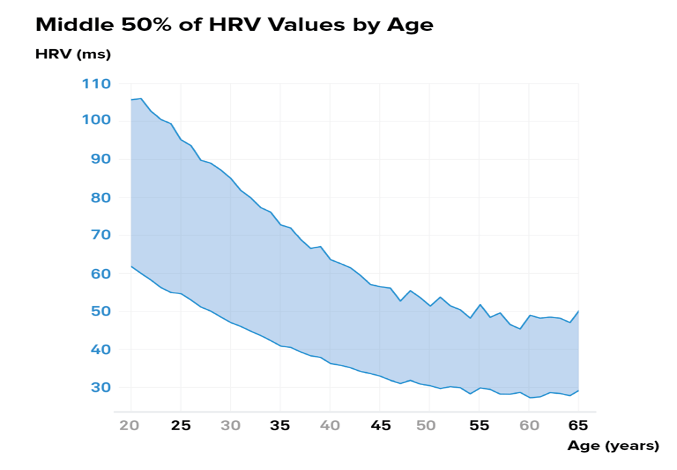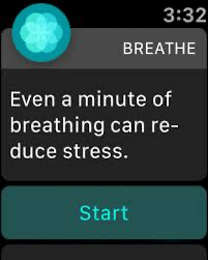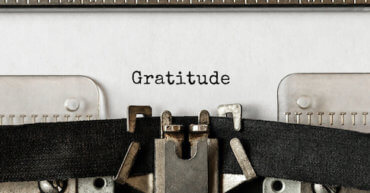January 15, 2021
The Importance of Breathing

It goes without saying that breath is necessary for life. But, like many of our bodily functions that occur automatically, we tend to take it for granted. I know I did. Looking back, I think I’ve been unconsciously holding my breath for years. Like many people, when stressed, I tend to contract my muscles, impeding both inhalation and exhalation, often leading to a proverbial breath-hold. In between, I suspect that I was taking quick, shallow breaths.
I became aware of the impact my poor breathing pattern was having upon my health when I stepped out of my low tech comfort zone and began wearing a Series 6 Apple Watch. For those who are unfamiliar, it measures many lifestyle strategies and physiological parameters, including activity, sleep, heart rate, blood oxygenation, V02 max, and heart rate variability (HRV). For those unfamiliar with HRV, it’s an exact measurement of the time between heartbeats as measured in milliseconds. We tend to think of our heart as beating steadily, like a metronome, but there’s actually a significant amount of variability between heartbeats.
High HRV — greater variability between heartbeats — is generally associated with optimal health. Those with higher HRV tend to have better cardiovascular fitness and to be more resilient to stress. High HRV is like a finely-tuned automobile that can accelerate and decelerate very quickly. In fact, HRV is a good non-invasive measure of the balance between the two parts of your nervous system — the sympathetic, which controls “fight or flight,” and the parasympathetic, which controls “rest and digest.” The former is vital for short term survival, while the latter is vital for longevity. Learn more about the sympathetic vs. the parasympathetic nervous system here.

Given the scientific evidence behind HRV, I was alarmed by my low numbers. I sometimes saw readings as low as 19! The average range for a 58-year-old is between 28 to 48. Something wasn’t adding up. I was exercising over an hour a day, eating well, optimizing sleep, meditating, etc. Everything else, as measured by my Apple watch, looked really good, but I was puzzled by my low HRV.

And then, I received a hint from the gods, well, really my Apple Watch. It was exhibiting an annoying habit of regularly interrupting me — reminding me to breathe. I was pretty sure I was already breathing, but I decided to play along. The reminder encourages the user to take a mindful breathing break for one minute. It features a breath pacer that guides the user to take seven deep breaths in one minute. Because I regularly meditate and am used to a considerably slower breath pattern, I found the faster breathing pace irritating and decided to ignore it. I still took regular breathing breaks, but I slowed my breathing to around five deep breaths through my nostrils per minute.
By engaging in these mindful breathing breaks with my eyes softly closed, I became acutely aware of how tightly I was holding the muscles in my shoulders and neck as I hunched over my computer throughout my workday. The frequent breaks were helping me to relax and to focus. I felt like I had more sustained energy throughout the day. Instead of feeling bothered by these breathing reminders, I started to look forward to my mini oxygen holidays. I began to voluntarily engage in them, taking special care to use this technique especially before meals, to help prepare my body for digestion.
Incredibly, my HRV also began to improve dramatically. The more breathing breaks I took, the higher my daily average began to creep up. Whereas in the beginning, my average was in the low 20s, my new average is now in the low 50s after only three weeks. Occasional readings in the high 80s are not unusual for me now. My HRV went from below the bottom quartile to above the top for my age group just by consciously focusing on my breathing.
Given the unprecedented and enormously stressful environment in which we live, I suspect that many of us are waiting to exhale. Our body’s ability to take in oxygen impacts our health on every level. It not only affects our stress response but impacts our sleep, energy levels, metabolism, and mood. I’ve accidentally stumbled upon an incredible new tool for optimizing health and couldn’t wait to share it with you all.
I’m reading James Nestor’s new book entitled Breath: The New Science of a Lost Art, and I highly recommend it for anyone who wants to take a deeper dive. It’s a new year, a perfect time for a reset. Start with mindful, cleansing breathing. I promise you’ll feel better.




